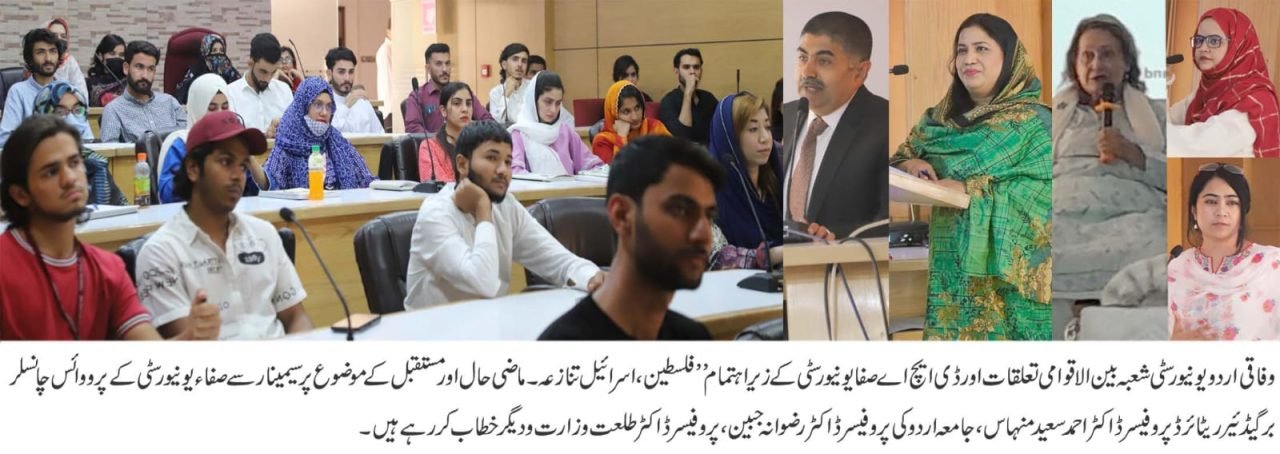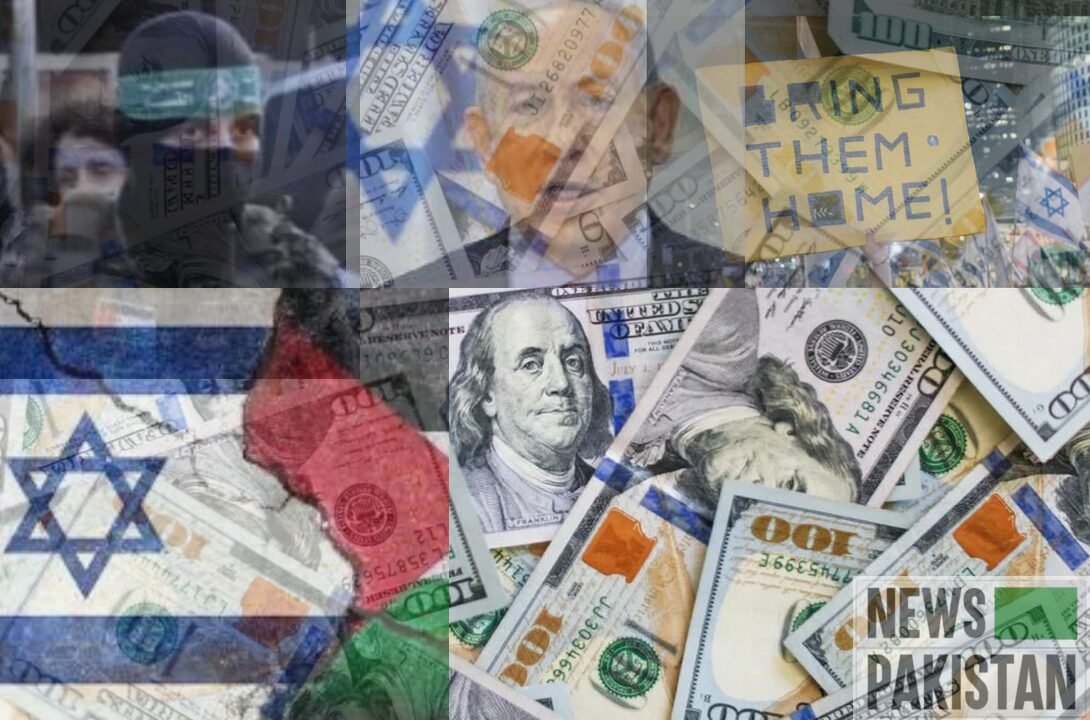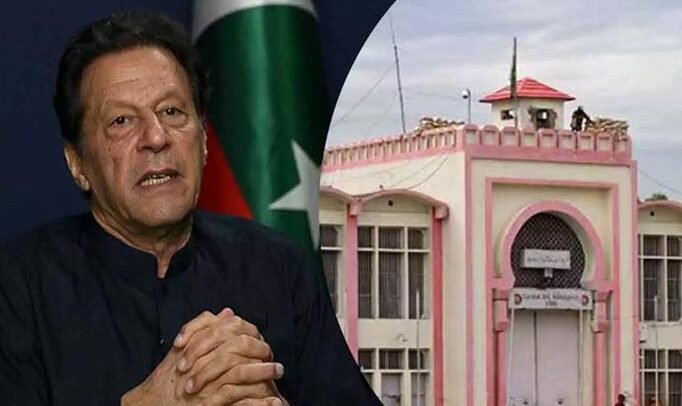Text By : Dr. Samreen Bari Aamir, Assistant Professor, DHA Suffa University, Karachi
KARACHI: Palestine’s problem won’t be solved until the Islamic countries keep refusing to take responsibility for their actions.
The fact that a fascist regime is ruthlessly killing, murdering, and assassinating innocent men, women, and children in the center point of the Muslim world is actually a failure on the part of the religion’s 1.9 billion adherents. Dr. Talat Wizarat, a well-known academic and researcher, stated this during a panel discussion titled Israeli-Palestinian Conflict: Past Present and Future organized by the Department of International Relations Federal Urdu University Karachi and the Program of International Relations DHA Suffa University.
When Dr. Rizwana Jabeen the moderator inquired about the history of the Israel-Palestinian conflict, Dr. Talat Wizarat explained in detail how the controversy was created and how the British seized land from the locals, the natives, the innocent Palestinians. She revealed that when Theodor Herzl, one of the principal founders of Zionism, made a request to the Ottoman state for a Jewish country long before the contentious Balfour Declaration started the colonization of Palestine at the behest of the British Empire. Herzl recognized an opportunity in real estate in 1896 and travelled to Istanbul with a deal he believed Ottoman Sultan Abdul Hamid II couldn’t refuse. By the late 19th century, the Ottoman state was groaning under a mountain of debt that today would be worth more than 11 billion dollar (todays value). One historical account claims that Herzl offered the Ottoman Sultan £20 million, or about $2.2 billion in modern money, in exchange for the Sultan issuing a charter for Jews to colonise Palestine.The Ottomans’ debt load would have decreased by about 20% with that amount of money. Herzel reportedly remarked that “the Turkish economy would not stand a chance of recovery without the help of the Zionists.”No matter how precarious Ottoman finances were, Philip de Newlinski and Arminius Vambery, Herzl’s advisers to the Ottoman Sultan at the time, were sceptical that Jerusalem, the third holiest place in Islam, would simply be sold. They were accurate. In 1896, Sultan Abdul Hamid II flatly declined the offer and informed Newlinski, “if Mr Herzl is as much your friend as you are mine, then advise him not to take another step in this matter. I cannot sell even a foot of land, for it does not belong to me but to my people. My people have won this Empire by fighting for it with their blood and have fertilized it with their blood. We will again cover it with our blood before we allow it to be wrested away from us.” We can study all these details in an article written by Elis Gjevori.
However, despite the refusal of that lucrative offer the Zionist movement did not compromise on its goal of obtaining the Holy Land. It is significant to note that in 1948, before the Zionist movement carried out its ethnic cleansing of Palestine, Jews controlled less than 6% of the country. The balance of land control between Palestinians and immigrant Jews shifted significantly as European Jews started to colonise Palestine, many of whom were motivated by anti-Semitic persecution in Europe.
The British, who controlled Palestine from 1917 to 1947 with the intention of establishing a Jewish state, helped to facilitate the project. As Zionists purchased land from absentee landlords between 1922 and 1935, the Jewish population increased from nine percent to nearly 27 percent of the total population, displacing tens of thousands of Palestinian tenants from their homes. Jews received 55% of the land under the 1947 UN Partition Plan, which included many of the largest cities with Palestinian Arab majorities and a significant stretch of coastline from Haifa to Jaffa. Using this strategy, the Palestinian state would be denied.
Dr. Rizwana posed a crucial question to Prof. Dr. Musarrat Amin, a social scientist and educator, regarding the peace process and the resolution of the conflict. She explained that while various peace agreements have been signed on various occasions, they are worthless because Israel is not committed to bringing about peace in the region. The Camp David Accords, the first peace accord between Israel and one of its Arab neighbours, were signed by Sadat and Israeli Prime Minister Menachem Begin on September 17, 1978, following nearly two weeks of covert negotiations at Camp David. At the Madrid peace conference in 1991, Israeli diplomats met with a joint Jordanian-Palestinian delegation. Israeli Prime Minister Yitzhak Rabin, who was the leader of the Labor Party, vowed to expedite the peace process when he was elected in 1992. He stopped the construction of new Israeli settlements in the occupied territory and gave the go-ahead for covert talks between Israel and the PLO, which started in Oslo, Norway, in January 1993. These negotiations produced a number of significant agreements that eventually led to the historic peace accord of September 13, 1993. In national elections in May 1999, Ehud Barak of the Labor Party defeated Netanyahu and vowed to take “bold steps” towards establishing a lasting peace in the Middle East. However, when Barak and Arafat were unable to come to an agreement at a summit in Camp David, Maryland, in July 2000, lengthy negotiations with the PLO came to an end.
Most recently The Abraham Accords, facilitated by the U.S. Administration between August and December 2020, are a set of agreements that normalize diplomatic ties between Israel, the United Arab Emirates (UAE), Bahrain, Sudan, and Morocco. These four Arab nations joined Egypt and Jordan in establishing peace with Israel in just five short months. In honor of Abraham, the patriarch of Judaism, Christianity, and Islam, the agreements were given the name “The Abraham Accords.” But until and unless Israel stops killing unarmed Palestinians, all of these agreements, negotiations, and conferences are worthless. Dr. Mussarrat, however, stated that she has faith in the next generation because both Israeli and Palestinian youth want peace and an improved future, not more bloodshed.
At the conclusion of the lecture, Dr. AHmed Saeed Minhas thanked the scholars and Ms. Sidra, a senior lecturer at DHa Suffa University also gave each scholar a gift of ajrak.

کراچی وفاقی اردو یونیورسٹی کے شعبہ بین الاقوامی تعلقات اورڈی ایچ اے صفا یونیورسٹی کے زیر اہتمام صفاء یونیورسٹی میں سیمینار کاانعقاد کیا گیا جس کا موضوع فلسطین ،اسرائیل تنازعہ ۔ ماضی ،حال اور مستقبل تھا ڈی ایچ اے صفا یونیورسٹی اس مذاکرے کے شرکاء میں ممتاز اسکالر پروفیسر ڈاکٹر طلعت وزارت ،پی اے ایف وار کالج کی اسسٹنٹ پروفیسر ڈاکٹر مسرت امین اور ڈی ایچ اے صفا یونیورسٹی کے پرووائس چانسلر بریگیڈیئر ریٹائرڈ پروفیسر ڈاکٹر احمد سعید منہاس شامل تھے ، جبکہ وفاقی اردو یونیورسٹی کی شعبہ بین الااقوامی تعلقات کی اسسٹنٹ پروفیسر ڈاکٹر رضوانہ جبین نے ماڈریٹر اور ڈی ایچ صفا یونیورسٹی کی سینئر لیکچرار سدرہ احمد نے نظامت کے فرائض انجام دیے۔
ممتاز ماہرین نے فلسطین ، اسرائیل تنازعہ پر سیر حاصل گفتگو کی اور اپنے خیالات سے طلبا کو آگاہی فراہم کی ، سیمینار میں شریک طلبا نے بین الاقوامی تعلقات کے ماہرین سے سوالات بھی کیے۔ آخر میں پرووائس چانسلر ڈی ایچ اے صفا یونیورسٹی پروفیسر ڈاکٹر احمد سعید منہاس نے مذاکرے میں شریک افراد کا شکریہ ادا کیا اور کہا کہ بین الااقوامی تعلقات کے دیگر موضوعات پر بھی سیمینار منعقد کیے جائیں گے۔
Newspakistan.tv











